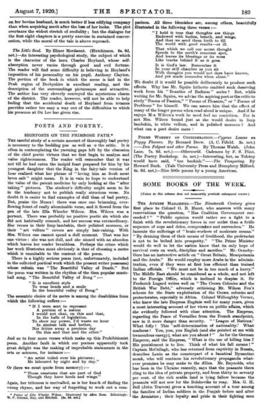POETS AND POETRY.
SIGNPOSTS ON THE PRIMROSE PATH.*
THE careful study of a certain amount of thoroughly bad poetry is necessary to the budding poe as well as o the critic. It is often in contemplating the yawning gaps left by the obsession of the chief poetic virtues that we first begin to analyse and value righteousness. The reader will remember that it was not till he had eaten the insipid feast prepared for him by his
youngest daughter that the King in the fairy-tale version of Lear realised what her phrase of "loving him as fresh meat loves salt" might mean. It is in vain to hope to understand the value of the patent medicine by only looking at the "after taking" pictures. The student's difficulty might seem to lie in the tendency not to publish really atrocious verse. No doubt it is easier to find examples of dull than of bad poetry.
But, praise the Muses ! there was once one brimming, over- flowing fount of really abominable verse, and it flowed from the pen of the late Ella Wheeler Wilcox. Mrs. Wilcox was a portent. There was probably no positive poetic sin which she did not habitually commit, and her success was extraordinary. Her verses in their limp lambskin, their polished morocco, or their "art vellum" covers are simply hair-raising. With Mrs. Wilcox one cannot spend a dull moment. That was her one virtue : she was not dull, and she sinned with an abandon which leaves her reader breathless. Perhaps the crime which her work illustrates most obviously is that of choosing a metre which is unsuitable to the content of the poem.
There is a highly serious poem (not, unfortunately, included in the collected poetical work which the present writer possesses) whose refrain was "The Beautiful Valley of Death." But the poem was written in the rhythm of the then popular music- hall song, "The Beautiful Valley of Bong" :— "it is excellent style To wear beads and a smile In the beautiful valley of Bong."
The eccentric choice of its metre is among the disabilities from which the following suffers :— " If I were sent to represent A portion of a nation I would not chat, on this and that, In the halls of legislation. To show my power, I'd waste no hour In aimless talk and bother, Nor fritter away a precious day On this and that and the other."
And so to four more verses which make up this Prohibitionist poem. Another fault in which our poetess apparently took great delight was the making of improbable statements in the arts or sciences, for instance :— "An artist toiled over his pictures ; He laboured by night and by day."
Or (here we must quote from memory) :-- "Those creatures that are part of God Though they have hoofs and wings."
Again, her triteness is unrivalled, as is her knack of finding the wrong rhyme, and her way of forgetting to work out a corn-
* Podia, of Ella Wheeler Wilcox. Illustrated by Alice sou. Rimburgh : W. P. Nimmo, Hay, and Mitchell. Ps. M. net.]
parison. All three blemishes are, among others, beautifully illustrated in the following three verses :—
"I hold it true that thoughts are things Endowed with bodies, breath, and wings, And that we send them forth to fill The world with good results—or ill.
That which we call our secret thought Speeds to the earth's remotest spot, And leaves its blessings or its woes Like tracks behind it as it goes.
It is God's law. Remember it In your still chamber as you sit With thoughts you would not dare have known, And yet made comrades when alone."
We doubt if it would be possible deliberately to produce such
effects. Why has Mr. Squire hitherto omitted such deserving work from his" Beauties of Badness" series ? But, while waiting for Mr. Squire, we advise the aspiring poet or the critic to study "Poems of Passion," "Poems of Pleasure," or "Poems of Problems" for himself. We can assure him that the effect of many of the longer poems when read aloud is unique. And if he enjoys 3/f.s. Wilcox's work he need feel no contrition. For is not Mrs. Wilcox bound just as she would desire in limp lambskin, in white vellum, and in polished morocco ? And what can a poet desire more


































 Previous page
Previous page